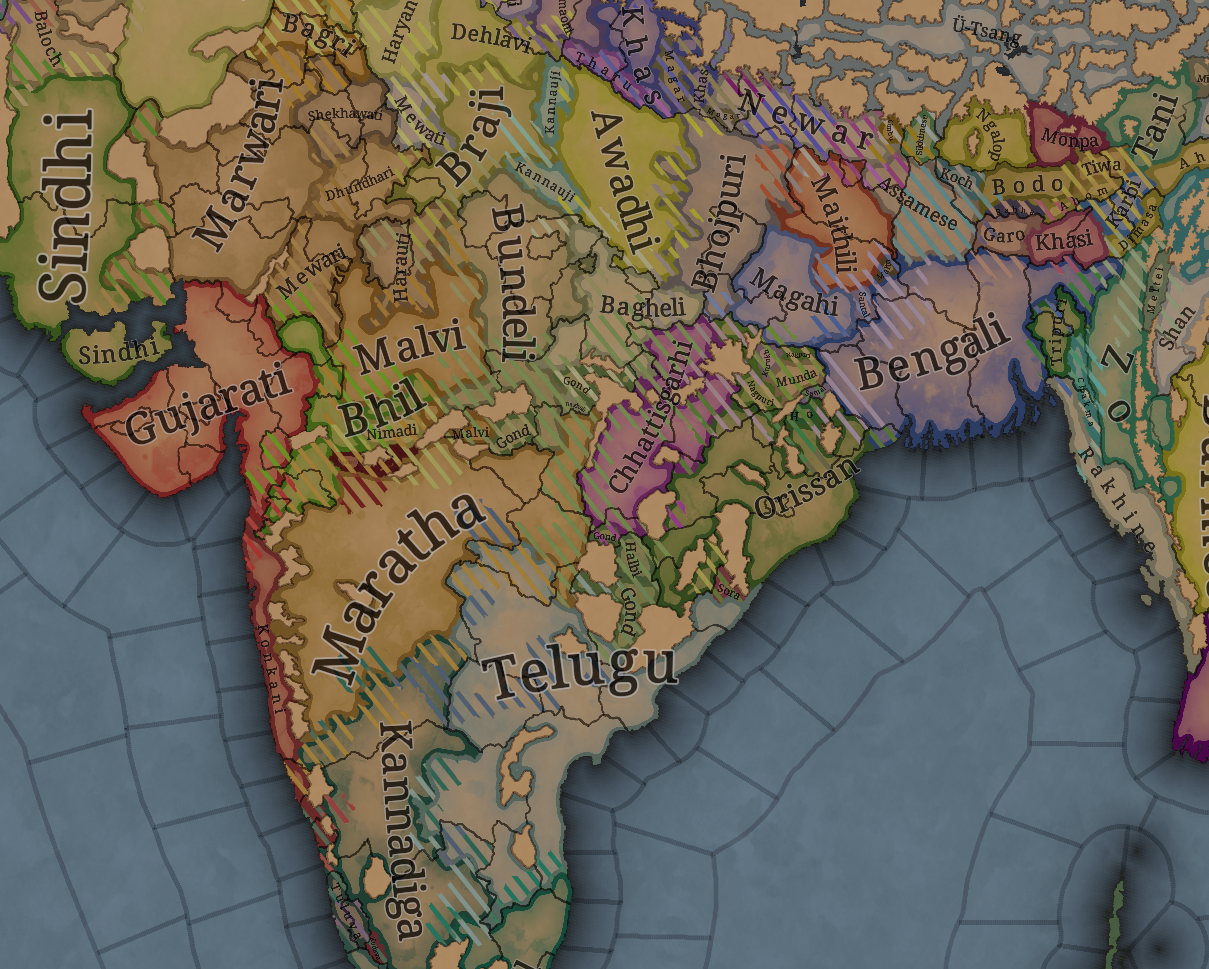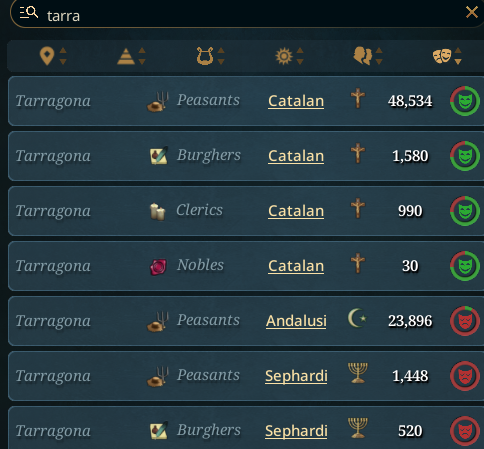欢迎来到 Tinto Talks 的第三周,我们将在这里讨论我们即将推出的游戏,其代号为“凯撒计划”。今天,我们将深入探讨一些可能会引起争议的问题。如果我们回到我们在第一篇开发日记中提到的一个支柱“可信的世界”,它有 4 个子支柱,其中两个对于今天来说很重要。
那么这对凯撒计划意味着什么呢?

地图上每一个可以定居的地点都可以有「pops」,或者正如我们在凯撒计划中经常提到的那样;人民。大多数地点从游戏一开始就已经有人了。今天我们讨论人民在游戏中的表现方式,并暗示他们将在游戏中影响的一些事情。

还有一些与POP相关的其他统计数据,我们首先设计了他们的识字率,这会影响他们所在国家的技术进步,也会影响POP对其生活地位的理解。
那么性能呢?

Welcome to the third week of Tinto Talks, where we talk about our upcoming game, which has the codename “Project Caesar.” Today we are going to delve into something that some may view as controversial. If we go back to one of the pillars we mentioned in the first development diary, “Believable World,” it has 4 sub pillars, where two of them are important to bring forward to today.
人口
Population
人口的模拟将成为经济、政治和战争一切事物的基础。
The simulation of the population will be what everything is based upon, economy, politics, and warfare.
模拟,而不是桌游
Simulation, not Board Game.
游戏机制之间应该让人能感觉到它们是相互配合的,这样你就会觉得自己在一个真实世界中玩耍,而不是抽象出来给人一种桌游的印象。
Mechanics should feel like they fit together, so that you feel you play in a world, and not abstracted away to give the impression of being a board game.
那么这对凯撒计划意味着什么呢?
So what does that mean for Project Caesar?
地图上每一个可以定居的地点都可以有「pops」,或者正如我们在凯撒计划中经常提到的那样;人民。大多数地点从游戏一开始就已经有人了。今天我们讨论人民在游戏中的表现方式,并暗示他们将在游戏中影响的一些事情。
Every location that can be settled on the maps can have “pops,” or as we often refer to them in Project Caesar; People. Most of the locations have people already from the start of the game. Today we talk about how people are represented in our game, and hint at a few things they will impact in the game.
具备相同的文化、宗教和社会阶层这三个属性,并位于同一地点的人群。无论人数多少均可视为一个人口单位(最少1人,最多不超过10亿),我们通常称之为「pop」
A single unit of people in a single location can be any size from one to a billion as long as they share the same three attributes, culture, religion, and social class. This unit of people we tend to refer to as a pop.
- 文化,即,如果他们是加泰罗尼亚、安达卢西亚、瑞典或其他文化。
- 宗教,即,天主教、路德宗、逊尼派等。这也没什么新鲜的。
- 社会阶层,在凯撒计划中,我们有 5 个不同的社会阶层。
- 贵族——这些人是金字塔顶端的人。
- 神职人员——代表牧师、僧侣等。
- 市民——这些人来自一个国家的城镇。
- 农民——这是人民的主体。
- 奴隶——仅存在于奴隶制合法的国家。
- Culture, ie, if they are Catalan, Andalusi, Swedish, or something else.
- Religion, ie, Catholic, Lutheran, Sunni etc. Nothing new.
- Social Class. In Project Caesar we have 5 different social classes.
- Nobles - These are the people at the top of the pyramid.
- Clergy - These represent priests, monks, etc.
- Burghers - These come from the towns and cities of a country.
- Peasants - This is the bulk of the people.
- Slaves - Only present in countries where it is legal.
还有一些与POP相关的其他统计数据,我们首先设计了他们的识字率,这会影响他们所在国家的技术进步,也会影响POP对其生活地位的理解。
There are a few other statistics related to a Pop, where we first have their literacy, which impacts the technological advancement of the country they belong to, and it also impacts the Pop’s understanding of their position in life.
另一个是他们当前的满意度,如果太低,会给某些人带来麻烦。目前满意度受到该国对其宗教的宗教宽容度、其对主流文化的文化关系、其文化的地位、该国普遍稳定度的影响,<有几件事我们现在还不能谈论>,当然还有特别的基于脚本的情况。
Another one is their current satisfaction, which if it becomes too low, will cause problems for someone. Satisfaction is currently affected by the country’s religious tolerance of their religion, their cultural view of the primary culture, the status of their culture, general instability in the country, <several things we can’t talk about just yet>, and of course specially scripted circumstances.
POP对游戏的军事、经济和政治部分也有间接的价值和影响,我们将在未来的开发日记中详细介绍。
There are also indirect values and impacts from a Pop on the military, economical and political part of the game as well, which we will go into detail in future development diaries.
人口会随着时间的推移而增长或减少、被其他文化同化、皈依宗教,甚至迁移。
Populations can grow or decline over time, assimilate to other cultures, convert to religions, or even migrate.
最重要的是,虽然人口是游戏的基础,但它是一个位于后台的系统,你只能间接控制它。
Most importantly here though, while population is the foundation of the game, it is a system that is in the background, and you will only have indirect control over.
那么性能呢?
What about performance then?
在设计该系统并进行代码实现时,最关键的需求是确保其具备良好的长期扩展性且不影响游戏性能。当然,现在我们已经讨论了地图的详细程度,目前地图上有 27,518 个独一无二的地点,而且其中许多都有POP,您可能会担心性能问题。
One of the most important aspects of this has been to design this system and code it in a way that it scales nicely over time in the game, and also has no performance impact. Of course now that we talked about how detailed our map is with currently 27,518 unique locations on the map, and with many of them having pops, you may get worried.
14 年前,我们发布了一款名为《维多利亚 2》的游戏,其地点数量仅为目前的 1/10,不过也有更多的社会阶层(或者说POP类型,按照那里的说法)。那个游戏还有一个深刻的政治系统,每个POP都关心多个问题,以及更多我们还没有做的事情。出于实际考虑,这个游戏中所有这些内容,在游戏逻辑上基本上都不是多线程的,但是在发布时仍然运行得足够快。
14 years ago, we released a game called Victoria 2, that had 1/10th of the amount of locations, but we also had far more social classes (or pop-types) as we called them there. That game also had a deep political system where each pop cared about multiple issues, and much more that we don’t do here. All in a game that for all practical purposes was basically not multi-threaded in the gamelogic, and was still running fast enough at release.
现在,我们正在根据数十年的经验构建游戏,到目前为止,POP对性能的影响还不明显。
Now we are building a game based on decades of experience, and so far the performance impact of having pops is not even noticeable.
下周,我们将讨论政府如何运作,但有些人可能会喜欢以下截图:
Next week, we will talk about how governments work a bit, but here is a screenshot that some may like:

最后编辑: